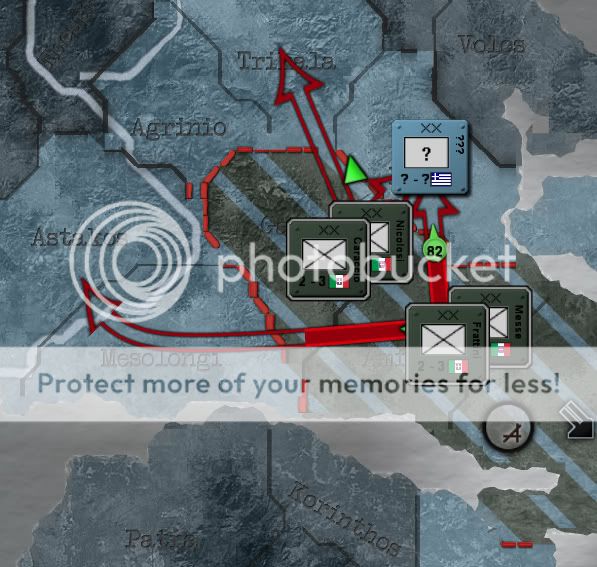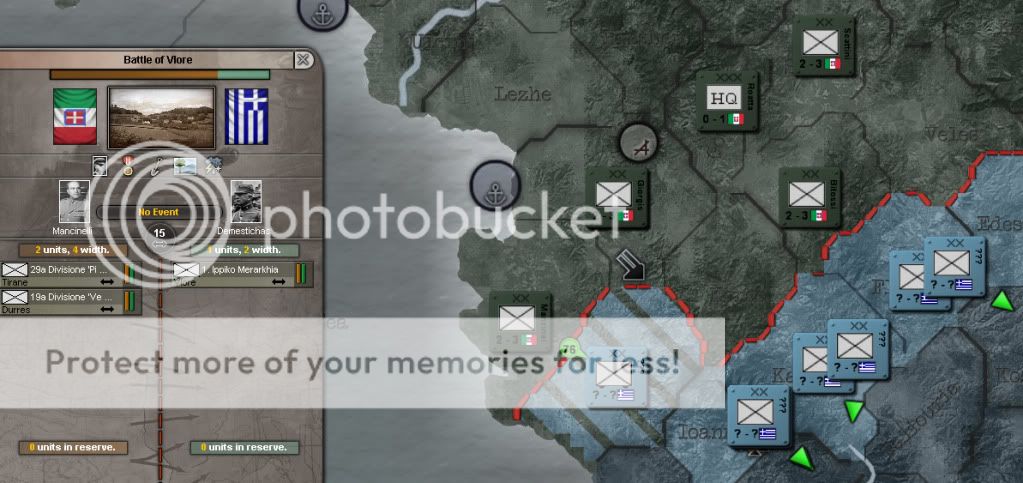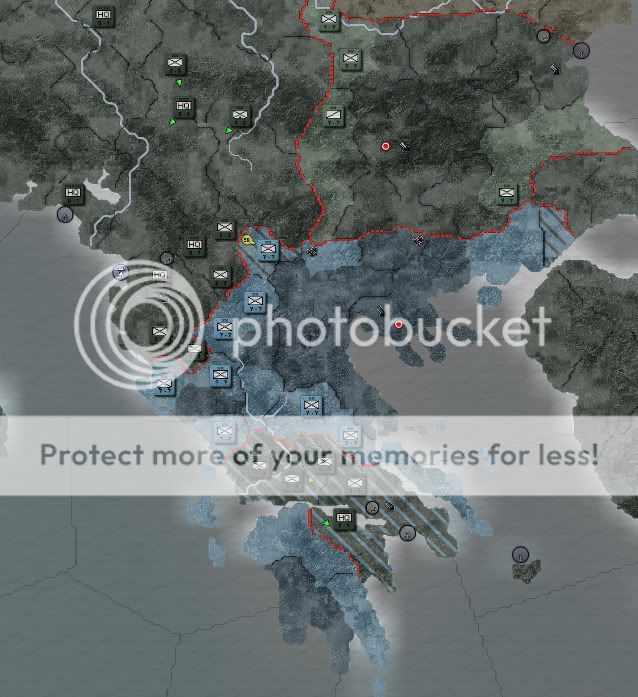n.y.o: I will conquer Suez later, with armed force. 
Maj. von Mauser: The problem with Romania is that it's army is pretty big. I'm actually very fortunate that they didn't intervene in my scuffle with Greece.
Piko: Thanks, and will do!
quetzilla: Yeah I too thought that Yugoslavia dragged on a bit, though I think you could see me skipping over more by the end and focusing on the more important stuff. I don't want to get too bogged down in the operational details really. And yeah, the problem with Greece is that it's a problem.
Baltasar: Actually no, it isn't. It isn't a quick way to victory, but I didn't actually really plan for that. Being the cynical bastard I am, a major part in my war calculations is combat experience of all types (and particularly land). If I wanted a quick war, I'd have landed at Athens and in Chalcidice (sp?), the triple peninsula where the other Greek VP is.
The Balbinater: I'd argue with the assumption that you can only concentrate on one at a time. With thirteen projects going simultaneously I'm doing fairly well I think, though I'm just concentrating on a handful of units (CLs, CVs, inf) and industry. Also, to call a war land-based is basically to state a given. Wars have to be land-based, there's no such thing as a war that isn't. People live on land, after all. Every other branch of the armed forces needs to, in the end, influence events on land. I'm still operating just in the littoral regions of the Med and other seas: wherever my armies operate, my CAGs can reach and thus my naval power can make itself felt. Furthermore, these are wars of resource conquest, so that I can then build up a bigger army to help me in my imperial ambitions!
Baltasar/Maj. von Mauser: I don't know enough about the Italian invasion of Greece to really comment much.
billy bob: Yeah, it does seem a bit silly, especially with the Italians having a major navy and all.
Stuyvesant: Well as I explained to Baltasar above, it's almost basically a haunting by choice given that all the VPs Greece has are accessible directly from amphibious landing. I just wanted some more combat experience! Also, to answer your question about the north: no.
Maj. von Mauser: The problem with Romania is that it's army is pretty big. I'm actually very fortunate that they didn't intervene in my scuffle with Greece.
Piko: Thanks, and will do!
quetzilla: Yeah I too thought that Yugoslavia dragged on a bit, though I think you could see me skipping over more by the end and focusing on the more important stuff. I don't want to get too bogged down in the operational details really. And yeah, the problem with Greece is that it's a problem.
Baltasar: Actually no, it isn't. It isn't a quick way to victory, but I didn't actually really plan for that. Being the cynical bastard I am, a major part in my war calculations is combat experience of all types (and particularly land). If I wanted a quick war, I'd have landed at Athens and in Chalcidice (sp?), the triple peninsula where the other Greek VP is.
The Balbinater: I'd argue with the assumption that you can only concentrate on one at a time. With thirteen projects going simultaneously I'm doing fairly well I think, though I'm just concentrating on a handful of units (CLs, CVs, inf) and industry. Also, to call a war land-based is basically to state a given. Wars have to be land-based, there's no such thing as a war that isn't. People live on land, after all. Every other branch of the armed forces needs to, in the end, influence events on land. I'm still operating just in the littoral regions of the Med and other seas: wherever my armies operate, my CAGs can reach and thus my naval power can make itself felt. Furthermore, these are wars of resource conquest, so that I can then build up a bigger army to help me in my imperial ambitions!
Baltasar/Maj. von Mauser: I don't know enough about the Italian invasion of Greece to really comment much.
billy bob: Yeah, it does seem a bit silly, especially with the Italians having a major navy and all.
Stuyvesant: Well as I explained to Baltasar above, it's almost basically a haunting by choice given that all the VPs Greece has are accessible directly from amphibious landing. I just wanted some more combat experience! Also, to answer your question about the north: no.







